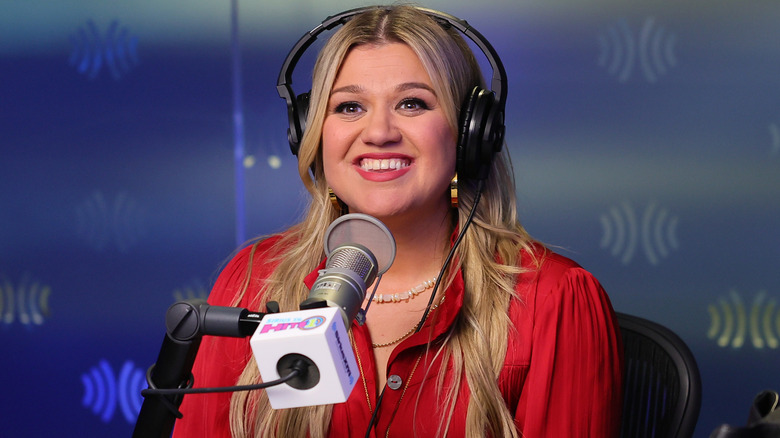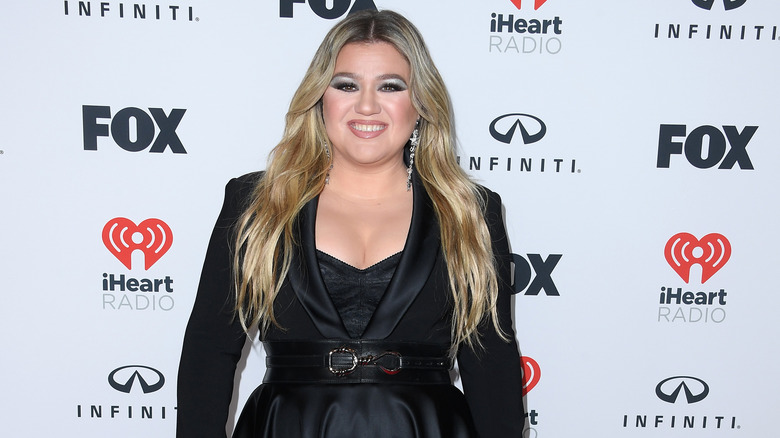Kelly Clarkson's Frank Antidepressant Admission Highlights Why Pill Shaming Needs To Stop
Kelly Clarkson has always been frank about how difficult her split from Brandon Blackstock was for her. By the time her divorce was finalized in March 2022, Clarkson had been put through the emotional wringer, and her upcoming album "Chemistry" is going to share that grief and pain. To promote the album, Clarkson has been making the rounds and being even more candid about what it took to get through the divorce. One of those things is the antidepressant Lexapro.
"I looked at my therapist and I just couldn't stop sobbing, and I was like, 'I actually had to cancel some of the other day because I couldn't stop crying. I cannot do this,'" Clarkson told Matt Rogers and Bowen Yang during an episode of the Las Culturistas podcast. "And it was one of those things where I really had to put my pride aside and like all my childhood issues of whatever." Adding that she wouldn't have made it through that time without the medication.
According to the Center for Disease Control, 11 percent of people take antidepressants and one-third of those with severe depression are medicated. The CDC reports that antidepressants are the third most common medication prescribed in the United States. Despite this, our culture still struggles to wrap its collective brain around the fact that some people need medication. Clarkson coming forward about turning to medication to overcome the physical and emotional toll of depression isn't just a big deal to those who take antidepressants and feel the stigma, but it's shining a spotlight on the fact that, yes, these pills are necessary for some people. In other words, pill shaming needs to stop.
Antidepressants save lives
A 2020 study published in Informed Health Online found that while antidepressants aren't as effective for those with mild cases of depression, those with chronic, severe, and moderate cases benefit from taking medication. What does this mean? Antidepressants work and there's a good chance they've played a role in keeping millions of people alive. But as much as this is true, it doesn't stop people from being judged. Celebrities, in particular, get villainized for their mental health often.
"I think, once and for all, we've answered the SSRI question. SSRIs work," professor of pharmacology at the University of Gothenburg Elias Ericksson told the Guardian, referring to his 2019 study published in Lancet Psychiatry. "They may not work for every patient, but they work for most patients. And it's a pity if their use is discouraged because of newspaper reports."
Although Clarkson was only on Lexapro for two months, the majority of those who have taken antidepressants, at 60 percent, have been on them for two years or longer. According to the CDC, 14 percent of those on such medication have been for 10 years or more. The reason for this is that while some cases of depression, like that of Clarkson, can be treated, other cases have to be managed. Managing depression is, for some, a lifelong task that involves therapy, medication adjustment over time, and learning ways to handle the illness as best they can. It can be a very difficult path to navigate, even with antidepressants.
The stigma surrounding antidepressants is deadly
For those who have never been diagnosed with depression, it's often inconceivable that someone could be a prisoner of their own brain. The fact that someone could wake up every day, doing their best not to drown, trying to push away the symptoms that come with depression, and put on a happy face for the world, is very much a reality. Suicidal ideation is real. A 2019 study published in Annals of General Psychiatry found that suicidal ideation is "quintessentially" associated with those who have major clinical depression.
Although not everyone with depression has these types of thoughts, for those who do and stay away from antidepressants because of the stigma, it can be a deadly combination. The stigma alone is deadly. Even if someone doesn't have suicidal ideation, it doesn't mean that depression isn't killing them in other ways, mentally and emotionally. They're suffering in silence, too afraid to get help, and even more afraid to take medication because of the shame associated with it.
As professor and author Brené Brown tweeted, "Shame can't survive being spoken. Shame needs [three] things to survive: secrecy, silence, and judgment," but when doused with empathy, it can't survive. This is a devastatingly accurate assessment of what shame does and the effects it has. While we can't shake the stigma completely from the narrative — only society as a whole can do that — we can, on an individual basis, do our part to speak up and show support when the topic enters a conversation. Kelly Clarkson taking Lexapro for her mental health isn't shameful. It means she's still here. And that's what matters.


